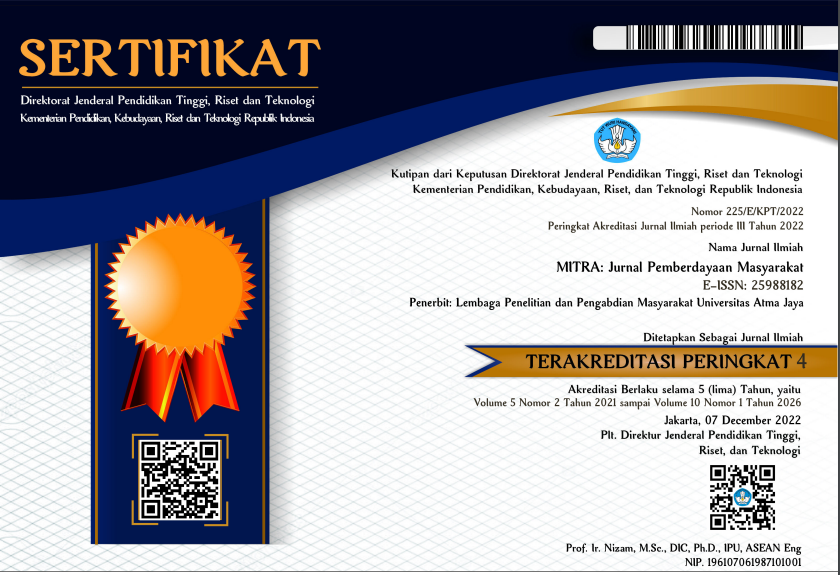Increasing the Digital Literacy among Tourism Awareness Groups for Sustainable Tourism Village Development
DOI:
https://doi.org/10.25170/mitra.v6i2.3552Keywords:
sustainable, tourism village, tourism awareness group, digital literacyAbstract
Given the effects of digital transformation on the tourism industry, the trends and paradigms in tourism have changed considerably, necessitating some creativity in the management of tourist villages as tourist destinations. The knowledge about the digitalization of tourism can in fact, help promote popular travelling sites, with both patrons and business owners benefitting from better systems of communication, reservation, and guest service. However, the institutional operations and management of the tourism awareness group (pokdarwis) in the community have yet to be optimally effective due to some institutional and managerial issues. Some 21st-century digital skills are identified to be helpful for this pokdarwis in its management of tourist villages, namely technical knowledge, information, communication, collaboration, creativity, and implementation of the Electronic Information and Transaction (ITE) Law. To support this effort, this community service activity (PKM) was carried out for 27 participants, who were all pokdarwis administrators, from May to October 2022, using a CBT approach. The results of the PKM activity indicate an increasing understanding that the ITE Law can provide a broad legal framework for online activities. There is also increasing awareness of social media as a communication medium that can facilitate online communication, exchange, and information access for the public, regardless of time or location. Of many social media platforms, YouTube and Instagram have become the options for publishing tourism information in Surau Village. It is nonetheless agreed that social media should be used with caution to avoid accusations of spreading false information and to ensure an effective implementation of the promotion activities. Considering this, mentoring in the use of social media in the marketing efforts will still be provided in the form of consultation, learning, and counseling.
References
Diana, & Setiawan, A. B. (2021). Evaluasi penerapan community based tourism (CBT). EFFICIENT: Indonesian Journal of Development Economics, 4(1), 1044–1065. https://doi.org/https://doi.org/10.15294/efficient.v4i1.42541
DM, M. Y., & Hardianto, R. (2022). Socialization of the ITE law, amid the widespread use of social media. Journal of Community Engagement Research for Sustainability, 2(1), 12–19. https://doi.org/10.31258/cers.2.1.12-19
Hakim, L., & Putro, W. E. (2022). New media dalam membantu kinerja humas pokdarwis mempromosikan wisata alam dan budaya di Ponorogo. Jurnal Ilmiah Dinamika Sosial, 6(1), 69–85. https://doi.org/10.38043/jids.v6i1.3382
Hayati, N. (2020). Optimization of community empowerment through improving the potential of the community in the new normal era proceeding of the non-formal education International Conference 2020 Optimization of Community Empower. Digital Press Social Sciences Humanities Proceeding, 6(9), 1–6.
https://doi.org/https://doi.org/10.29037/digitalpress.46375
Kementerian Kebudayaan dan Pariwisata. (2011). Peraturan Menteri Kebudayaan dan Pariwisata Nomor: KM.18/HM.001/MKP/2011 tentang Pedoman Program Nasional Pemberdayaan Masyarakat (PNPM) Mandiri Pariwisata.
Kementerian Koperasi dan Usaha Kecil dan Menengah. (2015). Buku panduan pengembangan desa wisata hijau. Asisten Deputi Urusan Ketenagalistrikan dan Aneka Usaha Kementerian Koperasi dan UKM Republik Indonesia.
KKN-PPM UGM BUAYAN MENAWAN. (2021). Buku pedoman kelompok sadar wisata (POKDARWIS).PPM UGM.
Kristiana, Y., & Nathalia, T. C. (2019). Peran pemangku kepentingan sebagai upaya pengembangan pariwisata di Kabupaten Biak Numfor. Jurnal Pariwisata Pesona, 4(1), 60–66. https://doi.org/10.26905/jpp.v4i1.2716
Nagy, K. X. H, & Segui, A. E. (2020). Experiences of community-based tourism in Romania: Chances and challenges. Journal of Tourism Analysis, 27(2), 143–163. https://doi.org/10.1108/JTA-08-2019-0033
Nugroho SBM. (2020). Beberapa masalah dalam pengembangan sektor pariwisata di Indonesia. Jurnal Pariwisata, 7(2), 124–131. https://doi.org/10.31294/par.v7i2.8810
Nurhajati, N. (2018). Dampak Pengembangan desa wisata terhadap peningkatan kesejahteraan masyarakat (Studi di Desa Mulyosari Kecamatan Pagerwojo Kabupaten Tulungagung). Jurnal Publiciana, 11(1), 1–13. https://doi.org/https://doi.org/10.36563/publiciana.v11i1.136
Permatasari, I. (2022). Peran model pengembangan pariwisata berbasis masyarakat (community based tourism) dalam mewujudkan pariwisata berkelanjutan (sustainable tourism) di Bali. Kertha Wicaksana : Sarana Komunikasi Dosen dan Mahasiswa, 16(2), 164–171. https://doi.org/https://doi.org/10.22225/kw.16.2.2022.164-171
Prasta, M., & Pradipta, Y. (2021). Pariwisata berbasis masyarakat sebagai pelestari tradisi di Desa Samiran. Jurnal Kepariwisataan: Destinasi, Hospitalitas Dan Perjalanan, 5(1), 99–109. https://doi.org/10.34013/jk.v5i1.379
Prastiani, N., & Pratiwi, R. Z. B. (2020). Promosi dan Pemasaran pariwisata objek wisata tirta sinongko dalam upaya menarik wisatawan. Profesi Humas Jurnal Ilmiah Ilmu Hubungan Masyarakat, 5(1), 38–57. https://doi.org/10.24198/prh.v5i1.21311
Prastiwi, D. E., Tohadi, Munir, B., & Ekawati, D. (2021). Sosialisasi Undang-Undang ITE dan dampak hukumnya bagi masyarakat. Abdi Laksana : Jurnal Pengabdian Kepada Masyarakat, 2(3), 416–424. https://doi.org/10.32493/al-jpkm.v3i2.20294
Punusingon, R. R., Lumenta, A. S. M., & Rindengan, Y. D. Y. (2017). Animasi sosialisasi undang-undang informasi dan transaksi elektronik. E-Jurnal Teknik Informatika, 12(1), 1–8. https://doi.org/https://doi.org/10.35793/jti.12.1.2017.17796
Putrawan, P. E., & Ardana, D. M. J. (2019). Peran kelompok sadar wisata (pokdarwis) dalam pengembangan pariwisata di Desa Munduk Kecamatan Banjar Kabupaten Buleleng. Locus Majalah Ilmiah FISIP, 11(2), 40–54. https://doi.org/https://doi.org/10.37637/locus.v11i2.279
Rohmy, A. M., Suratman, T., & Nihayaty, A. I. (2021). UU ITE dalam Perspektif Perkembangan teknologi informasi dan komunikasi. DAKWATUNA Jurnal Dakwah dan Komunikasi Islam, 7(2), 309–339. https://doi.org/https://doi.org/10.54471/dakwatuna.v7i2.1202
Santoso, A. D., Sriwijaya, U., Ayu, D., Angendari, D., & Mada, U. G. (2020). Desa cerdas: Transformasi kebijakan dan pembangunan desa merespon era revolusi industri 4.0 (E. A. Purwanto & D. Permadi (eds.); Issue May). Center for Digital Society Bekerjasama dengan Institute of Governance and Public Affairs (IGPA) UGM.
Suparwoko. (2011). Community-based approach to tourism in Indonesia. Deepublish.
Wijaya, N. S., & Sudarmawan, I. W. E. (2019). Community Based tourism (CBT) sebagai strategi pengembangan pariwisata berkelanjutan di DTW Ceking Desa Pekraman Tegallalang. Jurnal Ilmiah Hospitality Management, 10(1), 77–98. https://doi.org/https://doi.org/10.22334/jihm.v10i1 PISSN
Windarsari, W. R., Rohmat, Winarno, A., & Hermawan, A. (2021). Penerapan konsep community based tourism (CBT) dan pemberdayaan potensi pariwisata lokal untuk peluncuran Desa Wisata Kampung Kopi Sumberdem. Jurnal Graha Pengabdian, 3(3), 220–231. http://journal2.um.ac.id/index.php/jgp/article/view/26594/9171
Downloads
Published
How to Cite
Issue
Section
License
Copyright (c) 2022 Nurhayati Darubekti, Sri Handayani Hanum, Patricia Ekowati Suryaningsih, Deli Waryenti

This work is licensed under a Creative Commons Attribution-NonCommercial-ShareAlike 4.0 International License.
This license allows reusers to distribute, remix, adapt, and build upon the material in any medium or format for noncommercial purposes only, and only so long as attribution is given to the creator. If you remix, adapt, or build upon the material, you must license the modified material under identical terms.







_.jpeg)




.png)
2.png)
.png)
.png)



